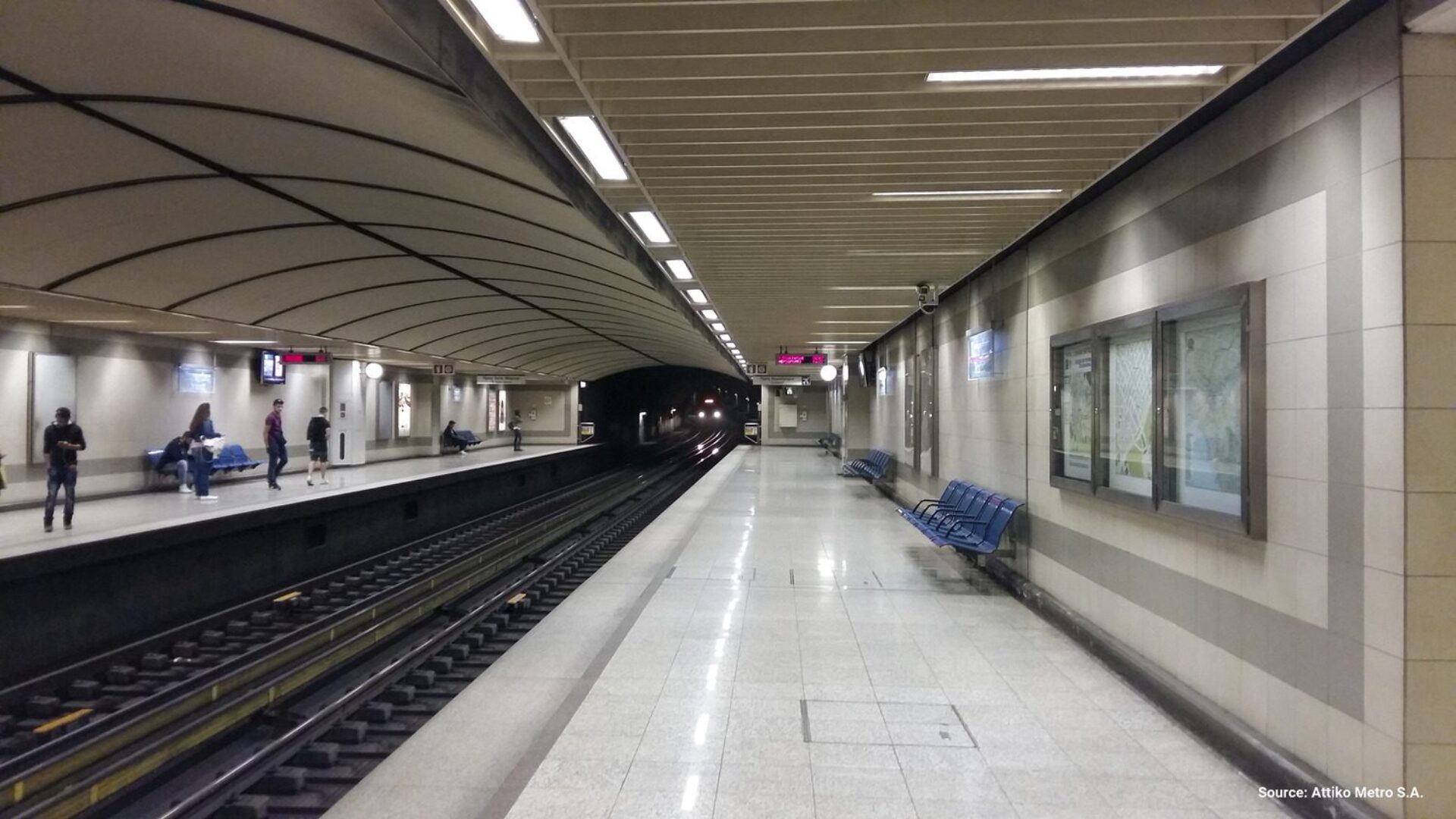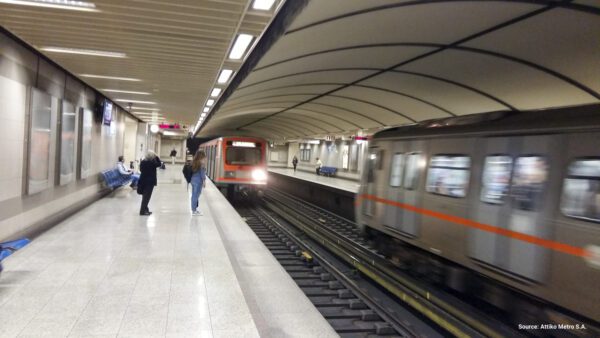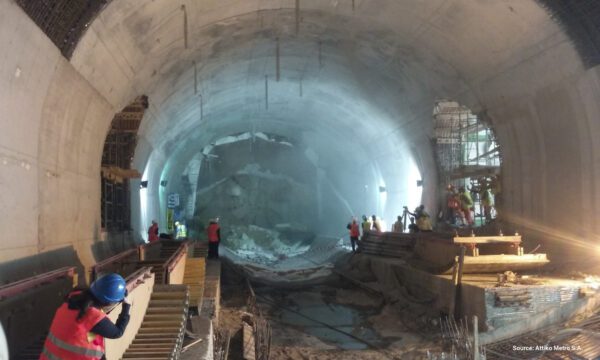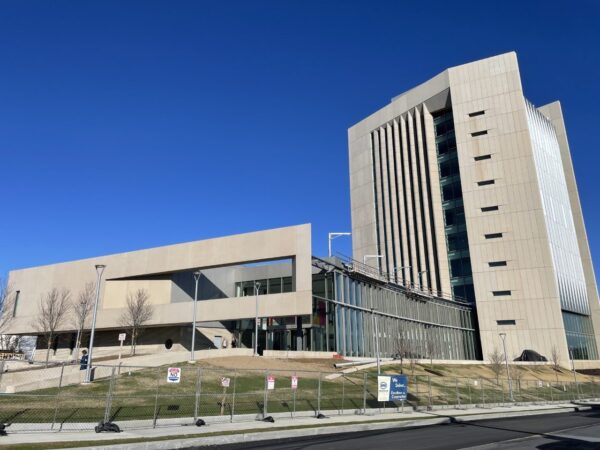
July 15, 2024 | Articles
Construction’s Digital Transformation & The Tools of Modern Project Management

Global program, project, and construction management firm Hill International is leading an international consortium to provide technical assistance consultancy services for Attiko Metro’s Line 4 metro project in Athens. To support Attiko Metro, Hill assembled a world-class technical assistance team with specific knowledge and experience with geotechnical and underground work in urban areas.
Line 4 of the Athens Metro is a truly transformational infrastructure project. A new, U-shaped line that traverses the heart of Athens, Line 4 encompasses two radial and one central part, spanning a total length of 38.2 km (23.74 mi), and divided into five individual distinct sections, A, B, C, D and E, which will include 35 stations.
Hill is supporting Section A: Alsos Veikou – Goudi of Line 4, which is currently under construction. Once complete, Section A will be approximately 12.8 km long and will include a tunnel connecting Line 4 with Lines 2 and 3, as well as an access tunnel to the train stabling and maintenance yard at Katehaki. Other project features include 15 underground stations and 9 intermediate and/or terminal shafts.
The Expertise to Enhance Execution
In the pursuit of Line 4’s successful implementation, Attiko Metro S.A. selected Hill International. Giannis Valavanis, Director of Metro & Rail Projects at Hill International, is leading Hill’s technical assistance team, helping Attiko Metro realize efficiencies and monitor work throughout the entire lifecycle of the project.

“The selection criteria for Attiko Metro’s tender process placed significant emphasis on the participating companies’ and core team’s experience with and knowledge in similar Metro Projects,” explains Valavanis. “Our core team of 11 subject matter experts bring expertise ranging from geotechnical designs to signaling/train control systems, rolling stock, and building information management (BIM).”
These experts are now leveraging their knowledge to provide Attiko Metro with specialized technical consultancy services, pertinent information, and optimization recommendations for the design, construction, and commissioning of Line 4, Section A. Moreover, the Hill consortium is supporting the Athens Tram extension projects and the production of tender designs and specifications for the new extension of Line 2 of Athens Metro, as well as the procurement of a new series of rolling stock.
In the coming months, the consortium’s core team will be reinforced with an additional 42 experts covering 24 different positions. Valavanis adds: “This specialized support will be critical in enhancing Attiko Metro’s capabilities to execute every activity (design, tendering, construction, testing, and commissioning) required in the framework of the technical scope of the projects under construction and the new ones, ensuring their successful completion.”

For Northwest Athens, Section A represents the initial phase of an anticipated larger development. Ultimately, these future extensions will reach Kifissias Avenue, one of the more heavily congested central thoroughfares of the capital, reaching its intersection with the Attiki Odos Ring Road. In addition, the line will extend further northwest through Amarousiou and Pefkis and Lykovrisi, close to the National Highway. To the west, the six-station extension from Alsos Veikou to Petroupoli is a priority, as this alignment will cover important areas of north-western Athens and connect Line 4 with Line 1 and the Suburban Railway. These developments are expected to significantly improve transportation connectivity and enhance the overall quality of life for Athens’ residents and visitors alike.
The project will also expand the existing Metro network and improve connectivity by adding two passenger interchange stations, with Lines 2 and Line 3, in Panepistimio/Akadimia and Evangelismos. Line 4 will enable convenient access to key infrastructure such as hospitals, educational institutions, organizations, ministries, museums, the City Courts, and other essential locations.
Improvements and Benefits from Construction Through Delivery
“Line 4 is an entirely new line,” says Valavanis. “It will alleviate the load on Line 3’s central stations, which are currently running close to capacity during peak hours. Two interchange stations connecting to Line 4 have been designed specifically to ease congestion at Line 3’s central stations.”
Given the subterranean operation of the Metro, the project is expected to have no visual impact on the surrounding communities. The inclusion of the Metro as a track-based transportation mode between the city center and Galatsi aims to attract more passengers and reduce the use of other modes of transportation. This shift in mobility patterns is expected to result in a reduction in car traffic and air pollution, and to a better acoustic environment.
Valavanis explains: “The positive socio-economic impact of the project is expected to be significant and become more evident over time. Improving mobility, saving time, ensuring safe transportation, and reducing gas emissions are all key elements that will contribute to enhancing the quality of life of residents within greater Athens.”
Proactive Support
He adds that bringing aboard technical consultancy support early will help Attiko Metro to realize Line 4 as planned: “The utilization of a project core team throughout the project execution will help drive consistency in the vision and delivery of the project, thereby assisting our client in achieving the delivery of a metro system that meets the highest standards of design, quality, and safety.”
At present, the team is providing support to Attiko Metro in the final and detailed phase of the Line 4 project. “Our experience in designing, constructing, commissioning, and operating similar automated metro systems allows us to proactively identify key issues related to design interfaces, systems integration, and operational issues,” says Valavanis. “This applies to both normal and degraded operation and emergency scenarios. This proactive approach enables Attiko Metro to mitigate potential issues that would otherwise be faced during the late design or commissioning phase.”
Tunneling Technologies
Line 4 is not without technical challenges. For example, the underground work for the project is extensive, with a geological environment comprising several bedrock formations, including Athens Schist, Sandstone-Marl Series, Ultrabasic Rocks, Crest Limestone, and Alepovouni Formation. Within this environment, the main tunnel, constructed to the standard Athens diameter like Lines 2 and 3, will have a double-track configuration, with an internal diameter of approximately 8.5 meters and an external diameter of approximately 9.5 meters (31.17 feet).

Excavation of the tunnels will be carried out using earth pressure balance-tunnel-boring machines (EPB-TBMs) equipped with the latest technology to account for the expected geological, hydrogeological, and geotechnical conditions. The first EPB-TBM, named Athena after the Greek goddess of wisdom, will start work from the end of the line at Katehaki, boring 5.1 kilometers (3.17 mi) of the tunnel to Evangelismos. The second TBM is expected to arrive in Athens later in 2023.
Valavanis explains: “These EPB-TBMs are specifically designed for urban environments, causing minimal disturbances and operating silently, with ground movements measured in millimeters even while digging at high speeds.”
The Future of Underground Systems
“Greenfield metro projects built on new, undeveloped sites, as opposed to expanding existing systems or upgrading old ones, are relatively rare in Europe due to limited space and the high cost and complexity of building new infrastructure in densely populated urban environments,” says Valavanis. “So, the construction of Athens Line 4 represents one of the most extensive undertakings of its kind—and in a densely populated urban area susceptible to earthquakes.”
Athens Line 4 incorporates numerous innovative features that set it apart from other underground metropolitan systems of similar size. Due to the lack of above-ground space and the challenging alignment, the project includes underground stabling sheds and maintenance tracks, a new Operations Control Center (OCC) building in the existing Sepolia Depot and an Emergency Control Center (ECC) located in the GNA shaft.
The system will also feature 20 completely automated 4-car trains that will operate without drivers or attendants. The use of advanced Communication-Based Train Control (CBTC) technology facilitates an operational headway of 90 seconds. Energy-saving measures include the recovery of energy generated during train braking: if not required by other accelerating trains in the vicinity, this recovered energy is fed back into the city’s high-voltage network, increasing overall energy efficiency.
Once complete, Athens Line 4 will represent a substantial advancement beyond conventional urban underground systems, placing it in a league with ongoing and new metropolitan rail projects across Europe and around the world.

Hill Senior Vice President and Managing Director, Europe, Emmanouil Sigalas says of the project: “We are delighted to be actively involved in one of the largest Metro projects currently underway in Europe. Our participation signifies our commitment to delivering exceptional technical consultancy services in Attiko Metro’s monumental endeavor on Line 4.”
“To ensure the highest quality of service, Hill has assembled an outstanding team consisting primarily of Greek experts, augmented by international professionals who bring a wealth of experience and diverse perspectives,” Sigalas continues. “This collaborative approach allows us to tap into the best talent from around the world while maintaining a strong local presence.”
Sigalas concludes: “Beyond this exciting project, Hill is building a dedicated team within our European organization specifically focused on executing major metro and rail projects across the continent. We remain dedicated to delivering excellence, innovation, and sustainable solutions in every aspect of our operations. We look forward to working closely with our partners, clients, and stakeholders to shape the future of transportation infrastructure across Europe.”
Share

July 15, 2024 | Articles
Construction’s Digital Transformation & The Tools of Modern Project Management

July 10, 2024 | Articles
GC/CM at Post Falls: Managing Avista’s North Channel Dam Rehabilitation Project

June 23, 2024 | Articles
Irv Richter – An Innovator, A Pioneer, A Leader (1944 – 2024)

June 14, 2024 | Articles
Environment of Care Standards – Meeting the Challenge (Part Two)

June 13, 2024 | Articles
PMO for Public Transit Project Success: The Reopening of Philadelphia’s Franklin Square Station

June 7, 2024 | Articles

May 17, 2024 | Articles
Hill Interim Federal Market Sector Leader Jane Penny Receives Golden Eagle Award

April 11, 2024 | Articles
A Model Move: Managing Move-In at the Sylvia H. Rambo U.S. Courthouse